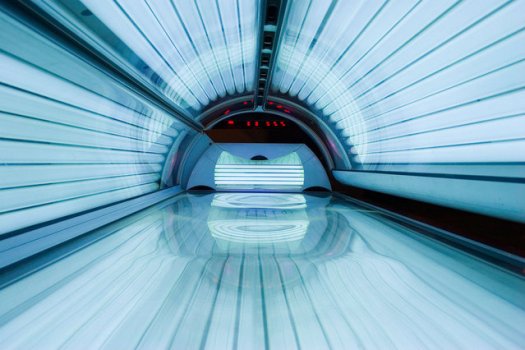Although most states have passed legislation to limit tanning bed use among U.S. minors, compliance with legislation remains a nationwide problem, researchers reported.
Results from a cross-sectional telephone survey of 427 tanning salons in 42 states and Washington found that 159 tanning salons (37.2%) were out of compliance with state legislation, reported Erik J. Stratman, MD, of Marshfield Clinic in Marshfield, Wisconsin, and colleagues.
In addition, rural locations (45.5%, 95% CI 37.5%-53.7%, P=0.009), the southern U.S. (49.4%, 95% CI 41.4%-57.4%, P=0.001), and independently owned tanning salons (43.9%, 95% CI 37.3%-50.6%, P<0.003) had the lowest rates of compliance, they wrote in JAMA Dermatology.
The researchers explained that the findings highlight the need for increased education and better law enforcement regarding state legislation, and the dangers of UV indoor tanning.
"It is estimated that banning indoor tanning for minors less than 18 years of age would prevent 61,839 melanomas, 6735 melanoma deaths, and save $342.9 million in treatment costs. The World Health Organization supports a ban on indoor tanning for anyone under the age of 18," Stratman told MedPage Today.
Stratman's group posed as minors and called 427 tanning salons -- 10 randomly selected from each state or territory with tanning legislation -- from Feb. 1, 2015, to April 30, 2016. They followed a telephone script saying that they wanted to get a tan before leaving for a family vacation, and inquired about the session costs and whether a parent needed to be present to consent for the tanning session.
Statistical analyses were then used to compare the difference in compliance rates for population, regional location, and time frame of legislation (before 2014 versus 2014-2016).
Stratman's group found that states that banned all minors had better compliance than states with any other type of tanning legislation (78.1% versus 55.5%, P<0.001).
The 16 states with two or more types of tanning legislation had a 50.0% noncompliance rate (95% CI 42%-58%, P<0.001), while the 27 states or territories with only one type of legislation had a noncompliance rate of 29.6% (95% CI 24.2%-35.5%, P<0.001). Illinois, New Hampshire, and Oregon had total compliance and Alabama had zero.
The most common reasons for noncompliance were allowing tanning with parental consent at the banned age (32.1% or 137/427), allowing tanning without the required parental consent or accompaniment (27.7% or 44/159), and allowing written parental consent only when parental accompaniment was required (19.5% or 31/159).
The authors called for further research to assess compliance of all states with state regulations, including whether increased compliance is linked to decreased skin cancer incidence over time.
Study limitations included the use of scripted telephone calls instead of in-person encounters, and the small sample size per state or territory.
"While these results demonstrate a clear problem with compliance, larger samples from individual states would provide more information about the extent of compliance issues with each state's laws," Stratman stated.
|
tanning salon |
solární studio, solárium |
|
Minor |
nezletilý |
|
Enforcement |
prosazování, uplatňování; vynucování; posílení |
|
Compliance |
dodržování; shoda |
|
Nationwide |
celostátní |
|
Rural |
venkovský, vesnický |
|
Owned |
vlastněný |
|
Indoor |
krytý; sálový, halový; domácí |
|
to pose as |
vydávat se za koho, prohlašovat se za koho |
|
Script |
scénář, text; rukopis |
|
to inquire |
zeptat se, poptat se, informovat se |
|
Session |
sezení; schůze, jednání |
|
Consent |
souhlas |
|
Banned |
zakázaný |
|
Accompaniment |
doprovod |
|
over time |
časem, v průběhu času |
|
in-person encounter |
osobní setkání |
|
Extent |
míra, rozsah, rozměr, rozloha; šíře |

